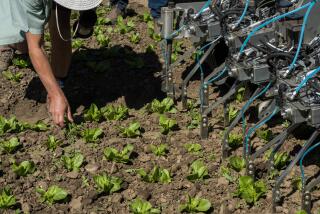Biotech Alone Can’t Solve World Hunger
- Share via
The image of a Third World child so weakened by hunger that he can’t even brush the flies away from his lips has unfortunately degenerated into a media cliche. Turn the page or change the channel and you can’t avoid the image. But that cliche starkly highlights what will be one of the most bitter North-South conflicts over the role of technology in feeding the starving masses--a conflict where there are no heroes and no villains, only trade-offs.
The conflict centers on the unnatural potential of agricultural biotechnology. Simply twiddle with a few genes, and the potential is that vital crops such as rice and sorghum can become astonishingly more drought tolerant, pest resistant and nutritionally enhanced. Agricultural bioengineers can craft crop to climate and to taste. They can engineer special microorganisms to help nourish and protect both the plants and the soil. Although genetically re-engineering agriculture has proven more difficult than many scientists had anticipated, no one questions that critical breakthroughs are just a few splices away.
Organizations such as the Rockefeller Foundation have taken the lead in bringing this technology to the Third World. “Our focus has been on the potential for genetically engineered crop plants,” says Robert Herdt, director for agricultural sciences at the Rockefeller Foundation.
Although no crops have yet been released, Herdt anticipates genetically engineered, disease-resistant rice to be introduced within five years. Work in genetically enhanced sorghum, cowpeas, cassava and other crops is also under way.
“The Third World is still ignorant of this technology,” Herdt adds. “They feel that there is a magic bullet out there that is being kept from them.”
“One of the great promises of biotechnology is that there will be this second ‘Green Revolution’ and that all the world’s hunger problems will be eliminated,” says Jack Doyle, director of the Agriculture and Biotechnology Project at the Washington-based Friends of the Earth. “The battle in the future will be how it’s packaged: Is it put in a seed? Or does it just become part of a process?”
But people are kidding themselves if they think that any biotechnology package offers the solution to the challenge of world hunger. No matter how it’s designed, this biotech package has enormous political, economic and environmental implications for both the Third World and the industrialized world.
Unfortunately, most of these implications are unpleasant.
In America, environmental activists like Jeremy Rifkin have successfully challenged the mass release of genetically engineered organisms into the environment. In West Germany, the Greens have similarly blocked agro-technology research initiatives. Their rationale is simple: We don’t know what impact these newly engineered organisms will have on the ecology.
Benign? Perhaps--but their environmental impact could also range from nuisance to catastrophe. Genetically engineered high-yield plants could become aggressive weeds; microbial organisms designed to protect crops could evolve into parasites that irrevocably destroy the soil.
“Microorganisms can move as easily across national boundaries as radiation,” Doyle notes.
So Third World deployment of biotechnology, these environmentalists argue, can have global repercussions.
Most responsible scientists dismiss these eco-disaster scenarios as fantasies of the uninformed. “When people are starving, they aren’t about to not grow food because of someone’s hypothetical hazard,” says Ron Davis, a professor of biochemistry at the Stanford Medical Center who does biotechnology consulting in India.
Nevertheless, many responsible scientists do acknowledge that the large-scale release of a broad variety of genetically engineered plants and microorganisms is far more likely to evoke unintended ecological consequences than the controlled cultivation of two or three re-engineered plants.
“I see the potential of biotechnologies as consistent with the concerns of environmental problems rather than counter to those concerns,” says Rockefeller’s Herdt. “But there can be problems.”
So should the West encourage the full-scale, no-holds-barred development of agricultural biotechnology in the Third World and risk environmental problems for everybody? Or does the West encourage a more moderate approach to the technology while millions more starve each year?
“That confrontation may occur in China and India,” says Herdt. “Rice will be the first issue.”
A decade ago, the Third World technology question was nuclear proliferation. In the 1990s, will that technology question be the proliferation of genetic engineering?
But even if you completely ignore the environmental concerns, the biotechnology challenge for the Third World and the industrialized nations is daunting. “The risk with genetically engineered plants may not be ecological so much as economic,” Friends of the Earth’s Doyle says.
Doyle points out that introducing high-yield plants into agricultural economies could accelerate the Third World’s trend to mass urbanization--the Shanghais, Calcuttas and Sao Paulos all bloated with too many people competing for too few resources within an infrastructure that’s already perilously overburdened.
This urban hypergrowth was one of the unanticipated consequences of the first Green Revolution. It is not at all impossible that the wrong biotech package may further undermine the fragile family farming economies of the Third World and leave it even more dependent on the West. Even if biotechnology delivers abundance, the Third World may end up trading famine for pestilence. What’s more, biotechnology can’t erase all the political and economic problems associated with food distribution--which many experts assert is the real cause of world hunger.
The picture is not unrelentingly bleak. There are movements for “sustainable agriculture” that blends biotechnology with economically pragmatic agricultural policies. Yet these are all evolutionary approaches that take time--time that millions of people do not have.
Does biotechnology have the potential to raise the standard of living and the quality of life in the Third World? Undeniably, yes. Is there also the very real possibility that the technology can also make a bad situation even worse? Absolutely. The trade-offs between economics and ecology in agricultural biotechnology will be one of the most painful issues between North and South as we enter the 1990s.
More to Read
Sign up for Essential California
The most important California stories and recommendations in your inbox every morning.
You may occasionally receive promotional content from the Los Angeles Times.













